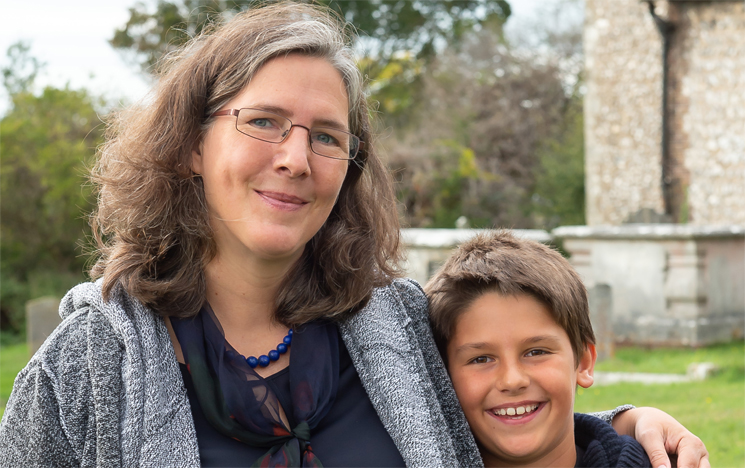How philosophy can help midwives communicate the wonder of childbirth
Philosophy Professor Tanja Staehler’s training module for the Royal College of Midwives gives new insights into how to help mums during delivery.

Although giving birth is one of the most natural experiences for most women, it’s often accompanied by shame, anxiety and fear.
The care birthing mothers receive from midwives is crucial, not just in terms of the medical attention they may need, but also for emotional support and understanding.
This was something that Tanja Staehler, University of Sussex Professor of Philosophy, first became aware of when she started her own family. After the experience of giving birth to three children, she began exploring how aspects of philosophical thought, especially around the strangeness of giving birth, could help midwives in their roles.
“There is a strong connection between the two,” she points out. “The philosopher Socrates described himself as a midwife in the way he helped give birth to ideas. And, indeed, his own mother was a midwife.”
In 2016 Staehler created an online learning module for the Royal College of Midwives, Communication in Labour, which has been completed by more than 600 midwives.
Giving birth as a life-defining moment
Its purpose has been to help midwives to remain sensitive to the notion that, for most women, giving birth is a life-defining moment, and is anything but ordinary.
Staehler says: “Our experience of having a body is such that we cannot conceive there could be another complete body emerging and that both bodies would come out intact. Women think about how it can happen but it doesn’t seem possible until it actually happens, and that’s when it leads to wonder.
“You have to give reassurance to women that it doesn’t feel very normal. And also to take their concerns seriously, even if they sound a little odd.”
The module consists of 15 short videos in non-academic language and an electronic diary for self-reflection. Staehler, together with speech communication expert, Dr Alexander Kozin, explains concepts such as Heidegger’s distinction between fear and anxiety. The former is related to something specific, for example a fear of heights, while the latter is related to ’unknowns’, which are plentiful when giving birth.
She also makes reference to Jean-Paul Sartre’s idea of ‘object’ and ‘subject’ - that we are aware we are either being looked at, or doing the looking, and that in stressful situations, such as in the throes of labour, we particularly rely on the viewpoints of others.
Communicating through touch
An essential concept in the context of attending to birthing mothers is that of ‘responsivity’. She encourages midwives to react according to what the mother wants rather than what the midwife assumes they want. This involves reading body language and using touch as much as communicating verbally.
“I used anecdotes from my own experiences to help with this,” says Staehler. “For example, I had a homebirth with my third child. I didn’t mind that I was naked, but my midwife kept trying to cover me, and that made me hot and got in the way.
“The idea is to encourage midwives to reflect on their own culture and experiences, perhaps around issues of shame, and not to impose those ideas on their patients. There shouldn’t be a ‘one size fits all’ approach.”
Staehler has received an enormous amount of positive feedback from midwives who have taken the module.
One wrote: ”I loved the concept of responsivity - and the need for both asking and observing as essential dimensions; the need for alertness/awareness of the ongoing situation are crucial. I was impacted by the reminder that one can communicate attentiveness without speaking, through human touch.”
Another commented that the module gave “fresh insight” into the woman’s perspective of childbirth and boosted her confidence to react instinctively. And another described how the module helped her overcome “overwhelming feelings of awkwardness” in how to communicate with women in labour.
Staehler’s work in this area has attracted international attention, with invitations to give presentations in Berlin and Vienna. She has also contributed to public discussion, organising an event during the Brighton Fringe Festival in 2017 to discuss birthing matters (Brighton has the highest homebirth rate in the UK), and has submitted evidence to the UK government on pregnancy and maternity discrimination.
Parents’ stories
With the wealth of material she has gathered from parents during her research, Staehler is also now compiling a book of the stories of their children’s birth.
She says: “Some parents I've spoken to didn't really enjoy the approach taken by TV series, such as One Born Every Minute, in which you see a lot of graphic material. But they said they wished they had known more about what would happen during labour, or how they might feel. Writing their stories has helped them to come to terms with how they felt.”
One of the stories is from a father who writes about having a healthy baby after his partner had a stillborn baby, and how he still grieved for the lost child.
Staehler says: “My direction of philosophy is existentialism, which involves reflecting on one’s own experiences. In that context it really is completely understandable that those are just two very different things. One child cannot replace the other. The grieving and mourning have to happen, even though there is now a healthy baby.
“Every human being is unique; even the tiniest ones. If we can learn to acknowledge this in our communication, we will be able to be there for each other.”
Contact us
Research development enquiries:
researchexternal@sussex.ac.uk
Research impact enquiries:
rqi@sussex.ac.uk
Research governance enquiries:
rgoffice@sussex.ac.uk
Doctoral study enquiries:
doctoralschool@sussex.ac.uk
Undergraduate research enquiries:
undergraduate-research@sussex.ac.uk
General press enquiries:
press@sussex.ac.uk